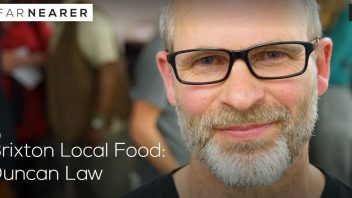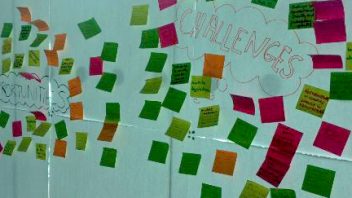
I’ve just returned from an eye-opening, mind-expanding week in Leipzig at the 4th Annual global Degrowth congress. This vibrant gathering brought together over 3,000, mostly young, ‘prosumer’ activists and practitioners from a variety of new economy movements from around the world.
I learnt a huge amount from makers, hacktivists, anarcho-syndical cooperativists, collaborative-commoners, anti-capitalists, free-culturalists, buen-vivir, transitioners, Fab-Lab-ers, p2p-ers and social-entrepreneurs from places as diverse as Spain, India, Bolivia and Brazil.
And continuing the theme of new economics, on the train back I read Jeremy Rifkin’s important new book the “The Zero Marginal Cost Society – the internet of things, the collaborative economy, and the eclipse of capitalism.”
In preparation for Degrowth I also spent three days in Meissen on a deep-dive with a small group of peer-to-peer (p2p) and commons movement leaders including David Bollier andMichel Bauwens who, in the introduction to his book, both praise Rifkin as a visionary of a new world order.
I was in Germany as part of the research and outreach for work on the Real Economy Lab, an initiative that aims to help connect theory and practice through a collaborative mind-mapping of the wider ecosystem of the post-growth new economy movement. The hope is that this process can form the start of a global alliance building to converge these various new economy movements into one force for good.
Germany was a good place to start as its probably the country furthest ahead in the combination of the Internet of Things, renewable, decentralized and community controlled energy, grassroots commons activists and ‘makers’.
One thing everyone I met have in common is a desire to create a new world order, a new way of creating, connecting and being which is beyond the market, beyond ownership, growth and capitalism. To them the idea of working for a large company for a wage has just never even been on the radar. Indeed the idea of large, shareholder owned private enterprises doesn’t feature in the world they are co-creating. Many of them have also conceptually, and in some cases, such as Cooperativa Integral Catalana, literally moved beyond any real relationship with politics and the state. Indeed, even the cutting edge of politics, Citizen-democracy parties like Partido X and Podemos, are running fast just to try to keep up with the convergence of these movements.
Emerging from this convergence is a powerful vision of a new world order and paradigm which represents real hope of building a bottom-up safety-net to catch the ever-more fragile top-down, as it unravels and collapses around us.
The new paradigm these movements are creating is post-enlightenment, lateral not hierarchical, chaordic, networked, decentralist, inclusive, open, rebellious and fun. It represents a near future that will test and fail much of the incumbent and dying models of politics and business. And it cocks a snoot at the Lockean, Millian and Social-Darwinian paradigm and story that has so atomised, excluded and isolated us from each other and so ravaged the planet.
What have till now been separate movements of the co-operative, commons, p2p, Transition and Makers are converging and learning that they have much in common and that if they stand and develop together they can be more than a side-show and thorn-in-the-side of the mainstream — they can become the mainstream in a new post capitalist, post growth world.
Jeremy Rifkin’s new book The Zero Marginal Cost Society is, along with Naomi Klein’s new “This Changes Everything – capitalism versus the climate,” a current must read. It documents an on-going shift to what Rifkin calls the Third Industrial Revolution. And it summarizes much of what I experienced last week in Leipzig about the coming together of the Internet of Things (IoT), the p2p worlds, the collaborative-commons and new economy movements.
Rifkin points to a central contradiction of capitalism which I find a useful addition to the new economy theories of people like Professors Schweickart, Olin-Wright and Alperovitz. This is that capitalism’s inbuilt dynamism drives it necessarily, if left to a truly free market, towards near-zero marginal costs of production for additional production units — what Rifkin calls ‘extreme productivity’. The implications of this are revolutionary — once at near-zero the system’s inbuilt dynamics stall and start to unravel — “goods an services become nearly free, the exchange of property on markets shuts down and the capitalist system dies”.
Thus the very DNA of capitalism, that which has made it such a success, has within it its own lethal sting in the tail. Its designed to kill itself. And to kill off any enterprise, such as the private shareholder owned corporate, reliant on its continuing. Capitalism has done its job and made itself redundant. If only we had made it to where we are now, on the edge of near-zero marginal costs, and the new economy it heralds, maybe 40 years ago, we might not now be in our nose-dive into possibly unstoppable, runaway climate chaos.
Rifkin’s view is that we are seeing the eclipsing of capitalism as a system and that incumbent centralised and vertically integrated profit-orientated businesses, whilst they will try to mimic, learn from and slip-stream this new order, will at best be carried only a short way on this journey to the new economy. Certain sectors like energy, health, finance and consumer products are first in the firing line. Some nimble incumbents in other sectors may morph into new forms of enterprise that can flourish within the new order.
The idea that we could soon all be able to 3D print our own homes, cars, clothes using open-access, open-source code, near-free energy and resources in local Fab Labs is mind-blowing but a near reality. It blows the hierarchical, inequality based current economy out of the (3d printed) bathtub. If done with a close eye on ecological limits it could herald a true circular economy.
I’ve long though the next paradigm will need to go beyond the tired state versus market, capitalism versus socialism debate and, as Rifkin says “the young collaborationists are borrowing the principles virtues of both the capitalists and the socialists, while eliminating the centralising nature of both the free market and the bureaucratic state”. I’m not sure what Marx would have made of the idea of the shift from exchange-value to ‘shared-value’, nor where this sits vis a vis ‘use value’ but as Rifkin says “The rule book that governs a market exchange economy becomes far less relevant to the life of society” in what he sees as the soon-to-be dis-enclosure of the means of production and the eclipsing of capitalism by the collaborative commons.
The vision of networked, open-source, open-access, exponentially-increasing extreme productivity in the hands of the masses, not private interests, is of course manna from heaven. I’m not entirely convinced by all of Rifkin’s logic. His future seems a world covered in endless Pv farms and wind turbines and his thinking on decoupling seems untested and incommensurable with the reality of the scale and intensity of energy and carbon reductions needed to keep us from a 4 degree world. But there is much in here which rings true.
Rifkin’s thinking dovetails nicely with Klein’s latest book which is also about the eclipsing of capitalism by people-power. Indeed Klein champions many of the movements I met in Leipzig and gave a keynote address to the congress.
This p2p, people-powered revolution in commerce, economics and democracy is all emergent stuff. Whilst experimentation is flourishing and producing real impact, the social and movement networks are not yet fully connected into a coherent global alliance. And as yet they don’t have an over-arching vision, narrative and route-map which can inform their various trajectories and combine to build a progressive anti Shock Doctrinaire alternative to the unravelling of our current systems.
But after what I’ve seen and heard this week I’m ever more optimistic. I feel a bit like I’ve just been plugged into the Matrix – only its not malign and its in our control. I’ve seen the future and it’s Fab-ulous.
Jules Peck is Founding Partner, Jericho Chambers; Trustee, New Economics Foundation, member of the Advisory Board of the B Team. Follow Jules Peck on Twitter.
Originally published by Huffington Post, 18 September 2014. This article is reposted here with the author’s permission and our thanks.










The eclipse of capitalism by means of business which puts people ahead of profit was argued in the 1996 position paper which introduced a people-centred approach to economic development and gave rise to the people-centred business model.
In 2008, with a blueprint for bottom-up development in Ukraine, it was introduced to the EU in their citizens consultation.
Today the EU along with Cooperatives Europe and Fair Trade UK promote a people-centred model of business and a people-centred economy. They are however strangely reluctant to engage with practitioners.
http://www.p-ced.com/1/node/354